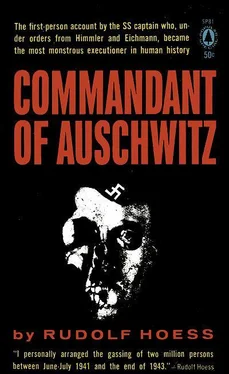Since I knew a certain amount about naval life, I was able to make myself inconspicuous. There was not much work to be done, so I had time to ponder deeply on what had happened.
By chance I heard one day, on the radio, the news of Himmler’s arrest and his death by poison. I, too, had my vial of poison always with me. But I decided to wait on events.
The Naval Intelligence School was removed to the internment district between the Kiel Canal and the Schlei. The British moved the SS men from their zone to the School, and concentrated them on the Friesian Islands. So I was quite close to my family, whom I was able to see quite often. My eldest boy visited me every few days. Since my profession was given as farmer, I was soon released. I passed through all the British control points without difficulty, and was sent by the labor office to work on a farm near Flensburg. I liked the work and I was completely independent, for the farmer was still being held by the Americans. I worked there for eight months. With the help of my wife’s brother, who worked in Flensburg, I was able to keep in touch with my wife.
I learned through my brother-in-law that I was being hunted for by the British Field Security Police. I also heard that they were keeping a close watch on my family, and repeatedly searched the house.
I was arrested on March 11, 1946.
My vial of poison had been broken two days before.
When I was aroused from sleep, I thought at first I was being attacked by robbers, for many robberies were taking place at that time. That was how they managed to arrest me.
I was maltreated by the Field Security Police.
I was taken to Heide where I was put in those very barracks from which I had been released by the British eight months earlier.
At my first interrogation, evidence was obtained by beating me. I do not know what is in the record, although I signed it. [100]
Alcohol and the whip were too much for me. The whip was my own, which by chance had got into my wife’s luggage. It had hardly ever touched my horse, far less the prisoners. Nevertheless, one of my interrogators was convinced that I had perpetually used it for flogging the prisoners.
After some days I was taken to Minden-on-the-Weser, the main interrogation center in the British Zone. There I received further rough treatment at the hands of the English public prosecutor, a major. [101]
The conditions in the prison accorded with this behavior.
After three weeks, to my surprise, I was shaved and had my hair cut and I was allowed to wash. My handcuffs had not previously been removed since my arrest.
On the next day I was taken by truck to Nuremberg, together with a prisoner of war who had been brought over from London as a witness in Fritsche’s defense. [102]
My imprisonment by the International Military Tribunal was a rest cure compared to what I had been through before. I was accommodated in the same building as the principal accused, and was able to see them daily as they were taken to the court. Almost every day we were visited by representatives of all the Allied nations. I was always pointed out as an especially interesting animal.
I was in Nuremberg because Kaltenbrunner’s counsel had demanded me as a witness for his defense. I have never been able to grasp, and it is still not clear to me, how I of all people could have helped to exonerate Kaltenbrunner. Although the conditions in prison were, in every respect, good—I read whenever I had the time, and there was a well-stocked library available—the interrogations were extremely unpleasant, not so much physically, but far more because of their strong psychological effect. I cannot really blame the interrogators— they were all Jews.
Psychologically I was almost cut in pieces. They wanted to know all about everything, and this was also done by Jews. They left me in no doubt whatever as to the fate that was in store for me.
On May 25, my wedding anniversary as it happened, I was driven with von Burgsdorff and Bühler to the airport and there handed over to Polish officers. [103]
We flew in an American plane via Berlin to Warsaw. Although we were treated very politely during our journey, I feared the worst when I remembered my experiences in the British Zone and the tales I had heard about the way people were being treated in the East. Also the expressions and gestures of the spectators at the airfield on our arrival were not exactly reassuring. In prison several of the officials immediately came at me, and showed me their Auschwitz tattoo numbers. I could not understand them, but it was obvious that they were not extending friendly greetings toward me. Nevertheless I was not beaten. My imprisonment was very strict and completely isolated. I was frequently interrogated. I was kept there for nine weeks. The time weighed heavily on me, for I had absolutely no distractions, not being allowed either to read or to write.
On July 30 I was taken to Cracow with seven other Germans. We had to wait for some time in the station there until the car had arrived. Quite a large crowd collected, and the people hurled insults at us. Göth was recognized at once. [104]
If the car had not come soon, they would have stoned us seriously. During the first few weeks we were treated quite well, but then suddenly the attitude of the prisoner officials changed completely and overnight. From their behavior and their conversation, the meaning of which was clear to me though I could not understand what they aid, I gathered that they wanted to “finish me off.” I was given only the smallest piece of bread, and less than a spoonful of thin soup. I was no longer given a second helping, although almost every day there was food left over which was divided among the inmates of the adjoining cells. If an official wanted to unlock my door, he was immediately whistled back. It was here that I became acquainted with the power of prisoners in position of authority over their fellows. They ran everything. They provided irrefutable proof of my contentions concerning the immense and often evil power which those prisoners with official positions exercise over different categories of guards.
If the public prosecutor’s office had not intervened, it would have been the end of me, not only physically but first of all from a psychological point of view. They had nearly driven me to the end of my tether.
It was not a question of feeble hysteria. I can stand up to a lot, and had taken plenty of hard knocks during my life. The mental torture inflicted by the three devils was too much for me. And I was not the only one to be persecuted in this way. Some of the Polish prisoners were severely maltreated by them as well. They have long since departed, and a welcome quiet now reigns.
I must admit that I had never expected such decent and considerate treatment as I received in Polish custody, once the public prosecutor had intervened.
What are my opinions today concerning the Third Reich?
What do I think of Himmler and his SS, the concentration camps, and the Security Police? How do I feel about all that was done in this sphere, and through which I passed?
I remain, as I have always been, a convinced National Socialist in my attitude to life. When a man has adhered to a belief and an attitude for nigh on twenty-five years, has grown up with it and become bound to it body and soul, he cannot simply throw it aside because the embodiments of this ideal, the Nationalist Socialist State, and its leaders have used their powers wrongly and even criminally, and because as a result of this failure and misdirection his world has collapsed and the entire German people been plunged for decades into untold misery. I, at least, cannot.
From the documents published and from the Nuremberg trials I can see that the leaders of the Third Reich, because of their policy of force, Avère guilty of causing this vast war and all its consequences. I see that these leaders, by means of exceptionally effective propaganda and of limitless terrorism, were able to make the whole German people so docile and submissive that they were ready, with very few exceptions, to go wherever they were led, without voicing a word of criticism.
Читать дальше












